人教版高中英语Book 3 Unit 1 Festivals around the world Grammar 情态动词教学课件 (共22张PPT)
文档属性
| 名称 | 人教版高中英语Book 3 Unit 1 Festivals around the world Grammar 情态动词教学课件 (共22张PPT) | 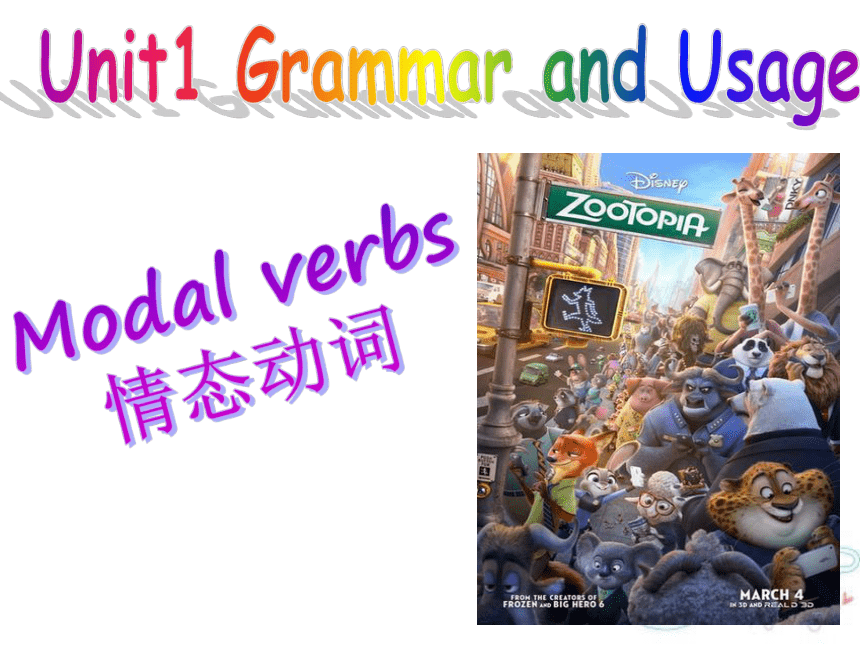 | |
| 格式 | zip | ||
| 文件大小 | 2.4MB | ||
| 资源类型 | 教案 | ||
| 版本资源 | 人教版(新课程标准) | ||
| 科目 | 英语 | ||
| 更新时间 | 2020-02-15 21:10:10 | ||
图片预览

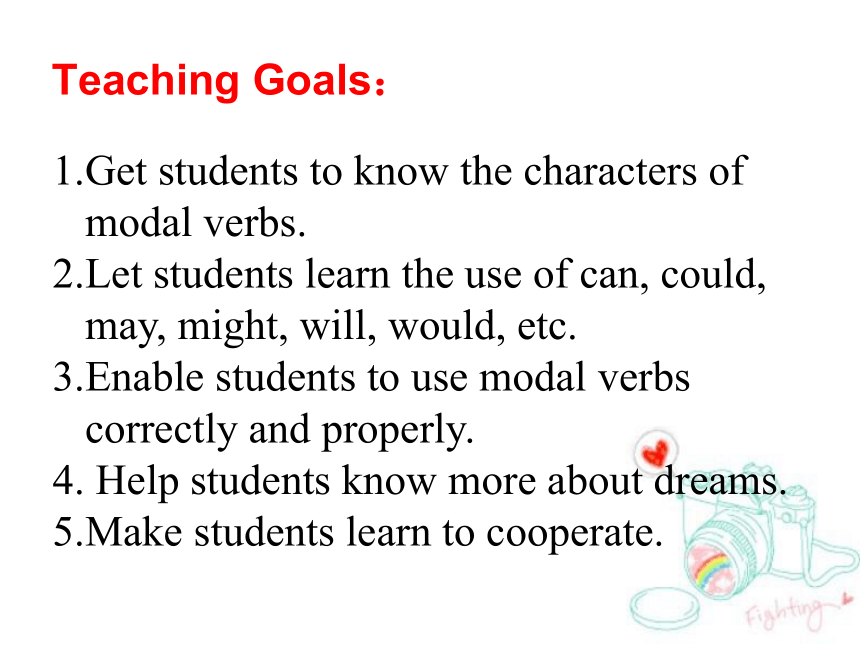


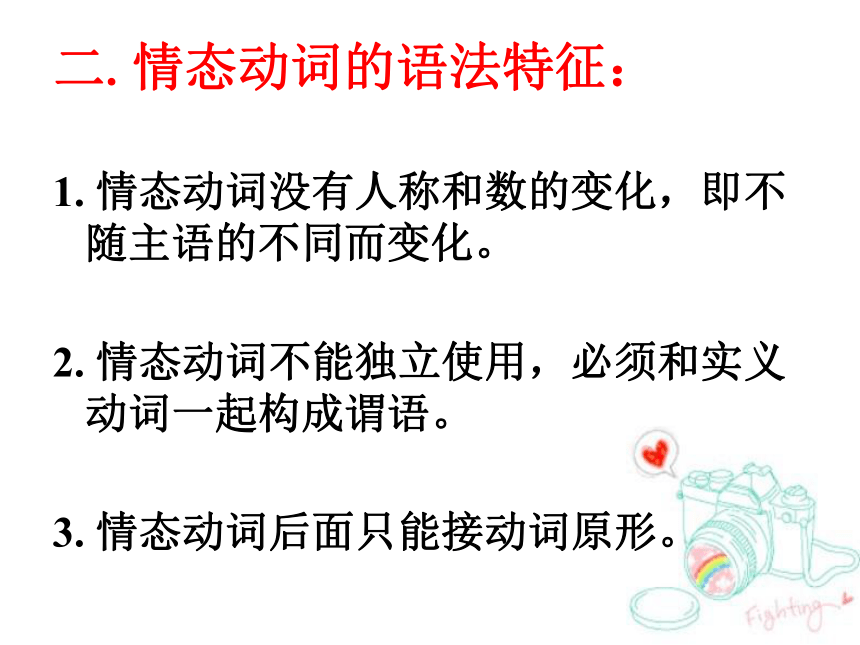
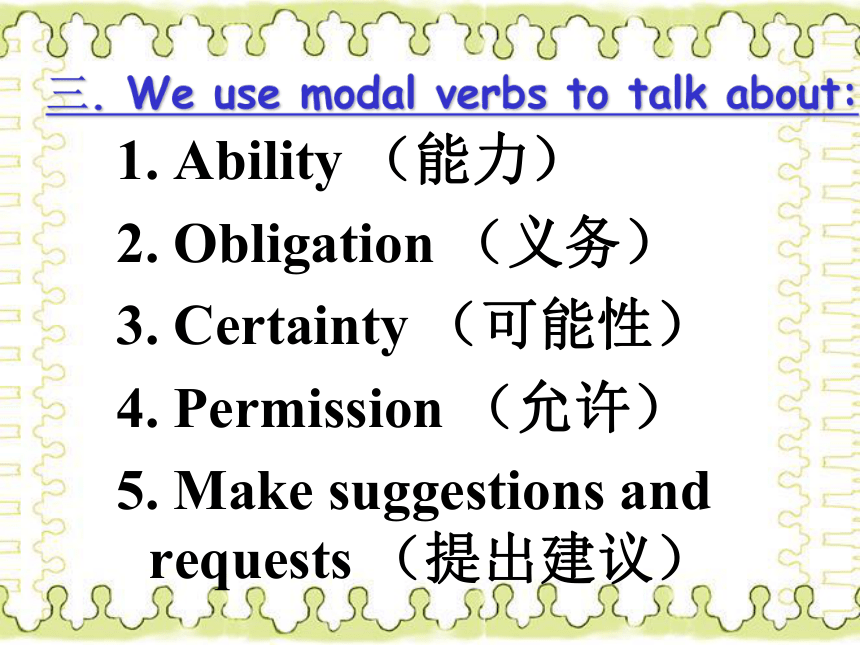

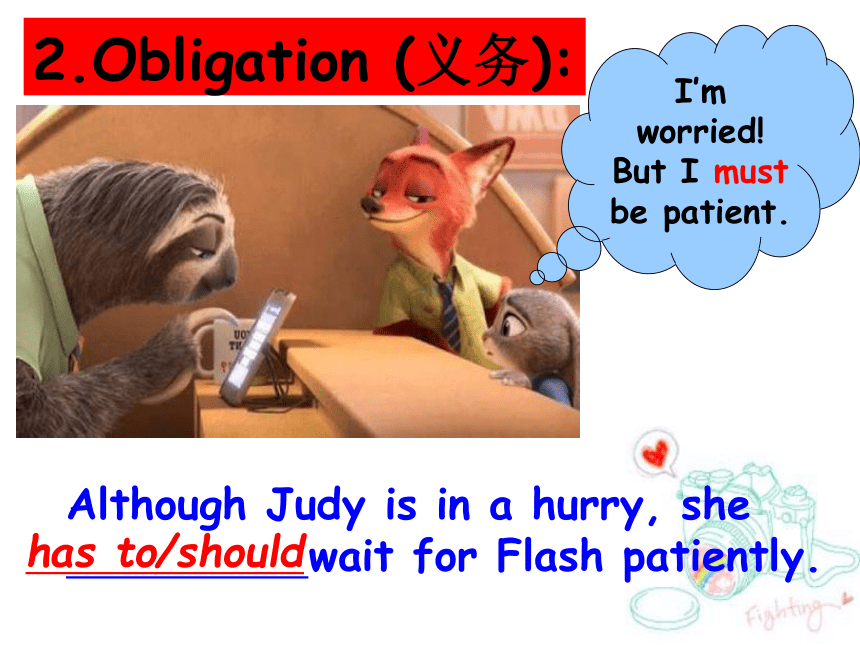
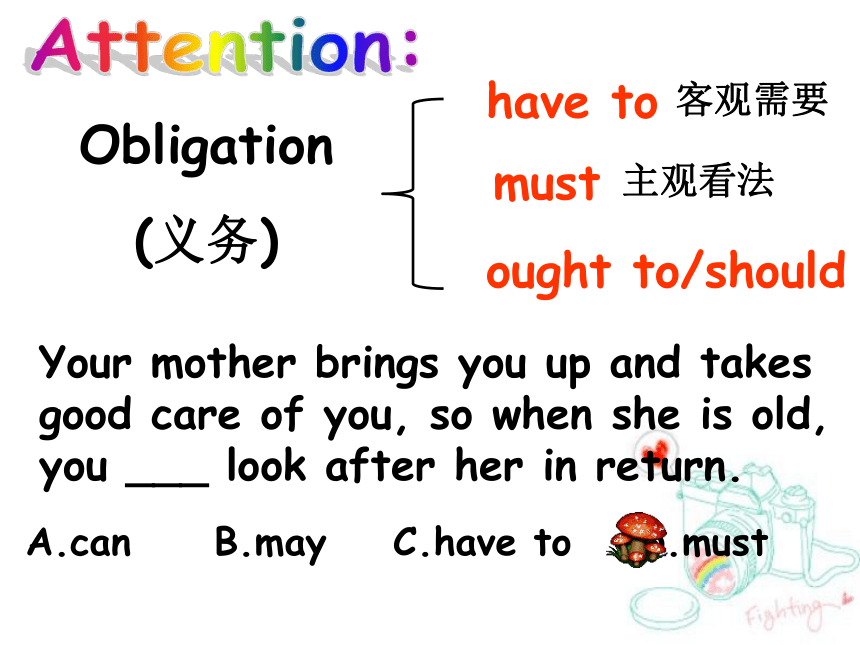
文档简介
(共22张PPT)
Teaching Goals:
Get students to know the characters of modal verbs.
Let students learn the use of can, could, may, might, will, would, etc.
Enable students to use modal verbs correctly and properly.
Help students know more about dreams.
Make students learn to cooperate.
We can be whatever we want.
We may be looked down on.
We should never lose hope.
We may get into trouble,
We should never give up.
We might doubt ourselves,
We must always have faith(信念).
Overcoming the difficulties, our dream will come true.
Fighting against all the fears, anyone can be anything.
Everything wills become better.
You shouldn’t sad as soon as you fail.
3. Jack can speaks a little Chinese.
4. Lily must finishing her homework.
5. May I to borrow your pen?
will
speak
finish
be
Can you find the mistakes?
二.情态动词的语法特征:
1. 情态动词没有人称和数的变化,即不随主语的不同而变化。
2. 情态动词不能独立使用,必须和实义动词一起构成谓语。
3. 情态动词后面只能接动词原形。
三. We use modal verbs to talk about:
1. Ability (能力)
2. Obligation (义务)
3. Certainty (可能性)
4. Permission (允许)
5. Make suggestions and requests (提出建议)
1.Ability (能力):
I run
very fast.
can
can/could 表示体力或脑力方面的能力.
2.Obligation (义务):
Although Judy is in a hurry, she
wait for Flash patiently.
I’m worried! But I must be patient.
has to
/should
ought to/should
have to
must
Your mother brings you up and takes good care of you, so when she is old, you ___ look after her in return.
A.can B.may C.have to D.must
Obligation
(义务)
客观需要
主观看法
Judy might want to take pictures with Nick.
3.Certainty (可能性) :
She may like me!
may/might
should
must
can / could
Certainty
(可能性)
肯定和否定句
否定句或疑问句
只能用于肯定句
表“应该,很可能”
2.He _____ be at home, for he just called me from his home 15 seconds ago.
A.may B.might C.must
1. He be at home now.
A. mustn’t B. can’t C. won’t
4.Permission (允许):
May I eat the ice cream?
我可以吃这个冰淇淋吗?(may)
你能实现我的梦想吗(can)?
Can you realize my dream?
表示许可时,may可与can/could换用, might比may的语气更委婉一些。
— Might/May/Can/Could I use your computer?
— Yes, you .
/No, you .
can
can’t/mustn’t
5.Making suggestions (提出建议):
we go for a ride?
you like to take a ride in my car?
Shall
Would
shall:
1.Shall用于 人称
句中,表示说话人征求对方的意见、向对方请示或提供帮助 。
1.Shall we begin our lesson?
2.When shall he be allowed to leave hospital?
3.Shall I carry this bag for you?
第一、第三
疑问
will/would:
1. 表示请求、建议,would比will委婉客气。
sentence
pattern
Would you please…
Would you mind…
Would you like…
2.表示意志、愿望和决心。
I will never do that again.
3.可表示经常性、习惯性、倾向性。翻译为“经常、惯于、总是”。
eg: Mr. Tiger play iPad when he takes the subway.
will
If the road ahead?is not so easy,
Our love lead the way for us
Just like a guiding star
I'll be there for you if you
need me
You don't change a thing
I love you just the way you are
So come with me and share the view
I'll help you see forever too
Hold me now
Touch me now
I don't want to live without you
Nothing's gonna change my love for you
You ought to know by now how much I love you
One thing you be sure of
I'll never ask for more than your love
Nothing's gonna change my love for you
You ought to know by now how much I love you
The world change my whole life through
But nothing's gonna change my love for you
will
should
have to
can
may
B意愿
D可能
C义务
A能力
D可能
能力
意愿
义务
可能性
Let’s write a short passage by using as many modal verbs as you can.
How can I realize my dream?
I have a dream. I believe I can…
If I want to realize my dream, I must/should…
Teaching Goals:
Get students to know the characters of modal verbs.
Let students learn the use of can, could, may, might, will, would, etc.
Enable students to use modal verbs correctly and properly.
Help students know more about dreams.
Make students learn to cooperate.
We can be whatever we want.
We may be looked down on.
We should never lose hope.
We may get into trouble,
We should never give up.
We might doubt ourselves,
We must always have faith(信念).
Overcoming the difficulties, our dream will come true.
Fighting against all the fears, anyone can be anything.
Everything wills become better.
You shouldn’t sad as soon as you fail.
3. Jack can speaks a little Chinese.
4. Lily must finishing her homework.
5. May I to borrow your pen?
will
speak
finish
be
Can you find the mistakes?
二.情态动词的语法特征:
1. 情态动词没有人称和数的变化,即不随主语的不同而变化。
2. 情态动词不能独立使用,必须和实义动词一起构成谓语。
3. 情态动词后面只能接动词原形。
三. We use modal verbs to talk about:
1. Ability (能力)
2. Obligation (义务)
3. Certainty (可能性)
4. Permission (允许)
5. Make suggestions and requests (提出建议)
1.Ability (能力):
I run
very fast.
can
can/could 表示体力或脑力方面的能力.
2.Obligation (义务):
Although Judy is in a hurry, she
wait for Flash patiently.
I’m worried! But I must be patient.
has to
/should
ought to/should
have to
must
Your mother brings you up and takes good care of you, so when she is old, you ___ look after her in return.
A.can B.may C.have to D.must
Obligation
(义务)
客观需要
主观看法
Judy might want to take pictures with Nick.
3.Certainty (可能性) :
She may like me!
may/might
should
must
can / could
Certainty
(可能性)
肯定和否定句
否定句或疑问句
只能用于肯定句
表“应该,很可能”
2.He _____ be at home, for he just called me from his home 15 seconds ago.
A.may B.might C.must
1. He be at home now.
A. mustn’t B. can’t C. won’t
4.Permission (允许):
May I eat the ice cream?
我可以吃这个冰淇淋吗?(may)
你能实现我的梦想吗(can)?
Can you realize my dream?
表示许可时,may可与can/could换用, might比may的语气更委婉一些。
— Might/May/Can/Could I use your computer?
— Yes, you .
/No, you .
can
can’t/mustn’t
5.Making suggestions (提出建议):
we go for a ride?
you like to take a ride in my car?
Shall
Would
shall:
1.Shall用于 人称
句中,表示说话人征求对方的意见、向对方请示或提供帮助 。
1.Shall we begin our lesson?
2.When shall he be allowed to leave hospital?
3.Shall I carry this bag for you?
第一、第三
疑问
will/would:
1. 表示请求、建议,would比will委婉客气。
sentence
pattern
Would you please…
Would you mind…
Would you like…
2.表示意志、愿望和决心。
I will never do that again.
3.可表示经常性、习惯性、倾向性。翻译为“经常、惯于、总是”。
eg: Mr. Tiger play iPad when he takes the subway.
will
If the road ahead?is not so easy,
Our love lead the way for us
Just like a guiding star
I'll be there for you if you
need me
You don't change a thing
I love you just the way you are
So come with me and share the view
I'll help you see forever too
Hold me now
Touch me now
I don't want to live without you
Nothing's gonna change my love for you
You ought to know by now how much I love you
One thing you be sure of
I'll never ask for more than your love
Nothing's gonna change my love for you
You ought to know by now how much I love you
The world change my whole life through
But nothing's gonna change my love for you
will
should
have to
can
may
B意愿
D可能
C义务
A能力
D可能
能力
意愿
义务
可能性
Let’s write a short passage by using as many modal verbs as you can.
How can I realize my dream?
I have a dream. I believe I can…
If I want to realize my dream, I must/should…
同课章节目录
